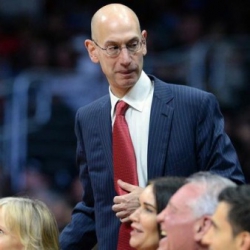
Adam Silver has supported legal sports betting since 2014, but only if the NBA receives a cut of the revenues.
NBA Commissioner Adam Silver said at a press conference Satruday his basketball league should receive a royalty from sportsbooks, if the Supreme Court legalizes sports betting in the coming months. Silver wants a 1% fee for the league’s “intellectual property” to offset costs the league would incur if gambling were legal.
The comments, made during the NBA’s All-Star Weekend, were the first time Adam Silver had discussed the subject since the NBA outlined a model framework for legal sports betting on January 24.
Adam Silver suggested the “1% integrity fee” at a Senate hearing on sports betting last year. The integrity fee would be 1% of a sportsbook’s “handle”, a term used to describe the turnover or total amount of money wagered and not the amount won by the house or the amount paid out. Even on bets the sportsbooks lost, they would pay a 1% fee for the action.
Adam Silver on 1% Integrity Fee
During his NBA All-Star Weekend press conference, Adam Silver said, “I would only say from the NBA’s standpoint we will spend this year roughly $7.5 billion creating this content, creating these games. Those are total expenses for the season. So this notion that as the intellectual property creators that we should receive a 1% fee seems very fair to me.”
Silver’s proposal has been met with criticism by the Las Vegas and international sportsbooks. Nevada sportsbooks pay a 6.75% gross gaming revenues tax, along with a 0.25% federal excise tax. Those bookmakers believe a 1% integrity fee would take as much as 15% to 20% of their revenues each year, which is beyond what they consider the tax percentage which would allow them to compete against unlicensed operators (12%).
A reporter asked Commissioner Silver whether he would consider a fee based on sportsbook revenues, instead of the handle. He told the reporter he was willing to discuss mechanisms which would produce a “fair result”. That sounded reasonable, but the various parties’ idea of a fair result might be wildly different.
Creating NBA Content
The argument that the NBA and other sports leagues own their statistics as “creative content” is a controversial one. Some sports league officials have proposed charging online websites fees for posting final scores and box scores from their games, because they own those scores. Online publishers have complained that those scores are a matter of public record, so their demand for fees would be no more valid than if public officials demanded compensation for appearing in news stories.
The idea seems shortsighted. While the NBA invests a lot of money each year to put on games, they are well-compensated for that investment through gate sales, broadcast rights (tv, radio, and Internet), and merchandise sales. Online publishers give the NBA and other leagues vast amounts of free exposure, which amounts to free advertising to hype their sports.
Free NBA Hype
The same goes for land-based sportsbooks. Gaming experts and financial analysts agree that legal sportsbooks in 50 states would help the American sports associations, because it would drive interest in the games.
Many sports bettors who do not watch games regularly would, because they would have personal money on the line. That drives TV and radio ratings, which would help the leagues in their next contract negotiation over broadcast rights.
Hidden Costs for NBA Games?
Legal sports gambling would be an economic boost to the various sports associations, including the NBA. The cost of organizing games would be no higher, simply because sports betting was involved. The league would put the games on anyway, so the idea they need to be compensated seems spurious.
If the sportsbooks needed special broadcast tools for their bettors, that would be something different. They wouldn’t need additional equipment. The games would be broadcast to the sportsbooks’ banks of TV screens, which the sites would pay fees to show, like anyone else. No new costs would be incurred.
NBA’s Cut of the Action
Adam Silver’s proposal is the opening salvo in negotiations. In 2017, Indiana Senate Jon Ford (R-Terre Haute) introduced a proposal that would charge gaming operators a fee for the cost associated with regulation of “gambling games”, if sports betting were legalized. The operators informed the Indiana Senate they might choose to forego land-based sportsbooks, because the fees would make such bookmaker operations unprofitable. Jon Ford omitted the proposal in the final draft of the gaming bill.
Sportsbook operators likely will make a similar argument about the 1% integrity fee. They can always threaten to pull out or collapse, which the sports leagues could not want. The NBA wants the added exposure sports betting would bring, so they want to set a rate that gives the NBA its cut of the action, without driving the legal bookmakers out of business.
